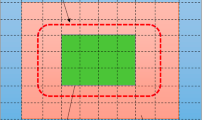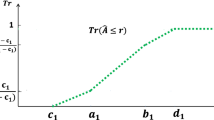Abstract
Transportation problem is the prominent class of mathematical programming problems that has a significant role in many practical transportation fields. Naturally, the transportation parameters inherently involve uncertainty in real life caused by lacking of information, imprecision in judgment, environmental factors, and etc. Therefore, it is very valuable to handle transportation problem under uncertainty aspect. The aim of this paper is to study the solution of the rough multi-objective transportation problem by supposing that the decision makers realize the transportation cost, availability and demand of the product as rough interval coefficients. The proposed approach exploits the merits of the weighted sum method to find the non-inferior solutions and it has two distinguishing features. Firstly, the proposed approach characterizes the surely Pareto optimal solution through converting the lower interval into two crisp transportation problems. Secondly, the proposed approach characterizes the possibly Pareto optimal solution through decomposing the upper interval into two crisp transportation problems. Furthermore, the expected nondominated value is applied to obtain the optimal compromise solutions of multi-objective transportation problem in rough environment. The presented approach is showed with rough multi-objective optimization problem as numerical illustration, where a wide set of the expected compromise solution ranged from 15.75 to 25.8 can be obtained. Furthermore, the investigation on the rough multi-objective transportation problem is conducted a real thought-provoking case study, where the optimal rough interval of transportation cost ranged from 97 to 314 can be achieved. With the adoption of rough environment modeling, a wide variate of optimal solutions can be achieved that can help the decision maker to extract the best compromise alternative according to practical situations. This represents a novel contribution to the decision making field and profit satisfaction models.



Similar content being viewed by others
References
Adhami A-Y, Ahmad F (2020) Interactive Pythagorean-hesitant fuzzy computational algorithm for multiobjective transportation problem under uncertainty. Int J Manag Sci Eng Manag 15(4):288–329
Akilbasha A, Pandian P, Natarajan G (2018) An innovative exact method for solving fully interval integer transportation problems. Inf Med Unlocked 11:95–99
Amaliah B, Fatichah C, Suryani E (2020) A new heuristic method of finding the initial basic feasible solution to solve the transportation problem. J King Saud Univ Comput Inf Sci. https://doi.org/10.1016/j.jksuci.2020.07.007
Aneja Y-P, Nair K-P-K (1979) Bicriteria transportation problem. Manage Sci 25:73–78
Apolloni B, Brega A, Malchiodi D, Palmas G, Zanaboni A-M (2006) Learning rule representations from data. IEEE Trans Syst Man Cybern Part A Syst Humans 36(5):1010–1028
Bagheri M, Ebrahimnejad A, Razavyan S, Lofti FH, Malekmohammadi N (2020a) Fuzzy arithmetic DEA approach for fuzzy multi-objective transportation problem. Oper Res Int J. https://doi.org/10.1007/s12351-020-00592-4
Bagheri M, Ebrahimnejad A, Razavyan S, Lofti FH, Malekmohammadi N (2020b) Solving the fully fuzzy multi-objective transportation problem based on the common set of weights in DEA. J Intell Fuzzy Syst 39(3):3099–3124
Bera S, Giri P-K, Jana D-K, Basu K, Maiti M (2018) Multi-item 4D-TPs under budget constraint using rough interval. Appl Soft Comput 71:364–385
Biswas P, Pal BB (2019) A fuzzy goal programming method to solve congestion management problem using genetic algorithm. Decis Making Appl Manag Eng 2(2):36–53
Biswas A, Shaikh A-A, Niaki S-T-A (2019) Multi-objective non-linear fixed charge transportation problem with multiple modes of transportation in crisp and interval environments. Appl Soft Comput 80:628–649
Bit A-K, Biswal M-P, Alam S-S (1992) Fuzzy programming approach to multicriteria decision making transportation problem. Fuzzy Sets Syst 50(2):135–141
Dantzig G-B, Thapa M-N (2006) Linear programming 2: theory and extensions. Springer, New York
Dash S, Mohanty S-P (2013) Transportation programming under uncertain environment. Int J Eng Res Dev 7:22–28
Düntsch I, Gediga G (1998) Uncertainty measures of rough set prediction. Artif Intell 106(1):109–137
Ebrahimnejad A (2016) New method for solving Fuzzy transportation problems with LR flat fuzzy numbers. Inf Sci 37:108–124
Ebrahimnejad A (2019) An effective computational attempt for solving fully fuzzy linear programming using MOLP problem. J Ind Prod Eng 26(2):59–69
Ebrahimnejad A, Verdegay JL (2018) A new approach for solving fully intuitionistic fuzzy transportation problems. Fuzzy Optim Decis Making 17:447–474
Ezekiel I-D, Edeki S-O (2018) Modified Vogel approximation method for balanced transportation models towards optimal option settings. Int J Civil Eng Techno 9:358–366
Hamzehee A, Yaghoobi M-A, Mashinchi M (2014) Linear programming with rough interval coefficients. J Intell Fuzzy Syst 26(3):1179–1189
Hassanien A-E, Rizk-Allah R-M, Elhoseny M (2018) A hybrid crow search algorithm based on rough searching scheme for solving engineering optimization problems. J Ambient Intell Human Comput. https://doi.org/10.1007/s12652-018-0924-y
Hitchcock F-L (1941) The distribution of a product from several sources to numerous localities. J Math Phys 20:224–230
Isermann H (1979) The enumeration of all efficient solutions for a linear multiple-objective transportation problem. Naval Res Logist Q 26(1):123–139
Jie Z, Jia-ming L, Zhen-ning D, De-yu T, Zhen L (2020) Accelerating information entropy-based feature selection using rough set theory with classified nested equivalence classes. Pattern Recogn 107:107517
José L-V, Yenny V, Cornelio Y, Itzamá L, Oscar C (2020) Granulation in rough set theory: a novel perspective. Int J Approx Reason 124:27–39
Karagul K, Sahin Y (2020) A novel approximation method to obtain initial basic feasible solution of transportation problem. J King Saud Univ Eng Sci 32(3):211–218
Kundu P (2015) Some transportation problems under uncertain environments. In: Peters JF, Skowron A, Slezak D, Nguyen HS & Bazan JG (eds) Transactions on rough sets XIX. Lecture notes in computer science, vol 8988, pp 225–365
Li J, Mei C, Lv Y (2013) Incomplete decision contexts: approximate concept construction, rule acquisition and knowledge reduction. Int J Approx Reason 54(1):149–165
Li J, Ren Y, Mei C, Qian Y, Yang X (2016) A comparative study of multigranulation rough sets and concept lattices via rule acquisition. Knowl Based Syst 91:152–164
Liang J, Qian Y (2006) Axiomatic approach of knowledge granulation in information system. Australasian Joint Conference on Artificial Intelligence. Springer, Berlin, Heidelberg, pp 1074–1078
Luhandjula M-K, Rangoaga M-J (2014) An approach for solving a fuzzy multiobjective programming problem. Eur J Oper Res 232(2):249–255
Mahajan S, Gupta S-K (2019) On fully intuitionistic fuzzy multiobjective transportation problems using different membership functions. Ann Oper Res:1–31
Majid A, Homa R, Seyede N-S (2020) Enhanced cultural algorithm to solve multi-objective attribute reduction based on rough set theory. Math Comput Simul 170:332–350
Majumder S, Kundu P, Kar S, Pal T (2019) Uncertain multiobjective multi-item fixed charge solid transportation problem with budget constraint. Soft Comput 23(10):3279–3301
Masoud M (2020) Integrating ABC analysis and rough set theory to control the inventories of distributor in the supply chain of auto spare parts. Comput Ind Eng 139:105673
Mishra A, Kumar A (2020) JMD method for transforming an unbalanced fully intuitionistic fuzzy transportation problem into a balanced fully intuitionistic fuzzy transportation problem. Soft Comput 24(20):15639–15654
Niroomand S, Garg H, Mahmoodirad A (2020) An intuitionistic fuzzy two stage supply chain network design problem with multi-mode demand and multi-mode transportation. ISA Trans 107:117–133
Pawlak Z (1982) Rough sets. Int J Comput Inform Sci 11:341–356
Pengfei Z, Tianrui L, Guoqiang W, Chuan L, Hongmei C, Junbo Z, Dexian W, Zeng Y (2021) Multi-source information fusion based on rough set theory: a review. Inf Fusion 68:85–117
Pratihar J, Kumar R, Edalatpanah S-A, Dey A (2020) Modified Vogel’s approximation method for transportation problem under uncertain environment. Complex Intell Syst 7(1):29–40
Ringuest J-L, Rinks D-B (1987) Interactive solutions for the linear multiobjective transportation problem. Eur J Oper Res 32(1):96–106
Rizk-Allah R-M (2016) Fault diagnosis of the high-voltage circuit breaker based on granular reduction approach. Eur J Sci Res 138(1):29–37
Rizk-Allah R-M, Hassanien A-E, Elhoseny M (2018) A multi-objective transportation model under neutrosophic environment. Comput Electr Eng 69:705–719
Roy S-K, Midya S (2019) Multi-objective fixed-charge solid transportation problem with product blending under intuitionistic fuzzy environment. Appl Intell 49(10):3524–3538
Sami N, Semeh B-S, Zied C (2020) Uncertainty mode selection in categorical clustering using the rough set theory. Expert Syst Appl 158:113555
Sarra B, Inès S (2020) A multicriteria approach based on rough set theory for the incremental periodic prediction. Eur J Oper Res 286(1):282–298
Sharma HK, Kumari K, Kar S (2020) A rough set approach for forecasting models. Decis Making Appl Manag Eng 3(1):1–21
Srinivasan R, Karthikeyan N, Renganathan K, Vijayan D-V (2020) Method for solving fully fuzzy transportation problem to transform the materials. Mater Today Proc. https://doi.org/10.1016/j.matpr.2020.05.423
Stanković M, Gladović P, Popović V (2019) Determining the importance of the criteria of traffic accessibility using fuzzy AHP and rough AHP method. Decis Making Appl Manag Eng 2(1):86–104
Tao Z, Xu J (2012) A class of rough multiple objective programming and its application to solid transportation problem. Inf Sci 188:215–235
Uddin M-S, Miah M, Khan M-A-A, AlArjani A (2021) Goal programming tactic for uncertain multi-objective transportation problem using fuzzy linear membership function. Alex Eng J 60(2):2525–2533
Wei W, Liang J (2019) Information fusion in rough set theory: an overview. Inf Fusion 48:107–118
Author information
Authors and Affiliations
Corresponding author
Additional information
Communicated by Marcos Eduardo Valle.
Publisher's Note
Springer Nature remains neutral with regard to jurisdictional claims in published maps and institutional affiliations.
Rights and permissions
About this article
Cite this article
Garg, H., Rizk-Allah, R.M. A novel approach for solving rough multi-objective transportation problem: development and prospects. Comp. Appl. Math. 40, 149 (2021). https://doi.org/10.1007/s40314-021-01507-5
Received:
Revised:
Accepted:
Published:
DOI: https://doi.org/10.1007/s40314-021-01507-5




